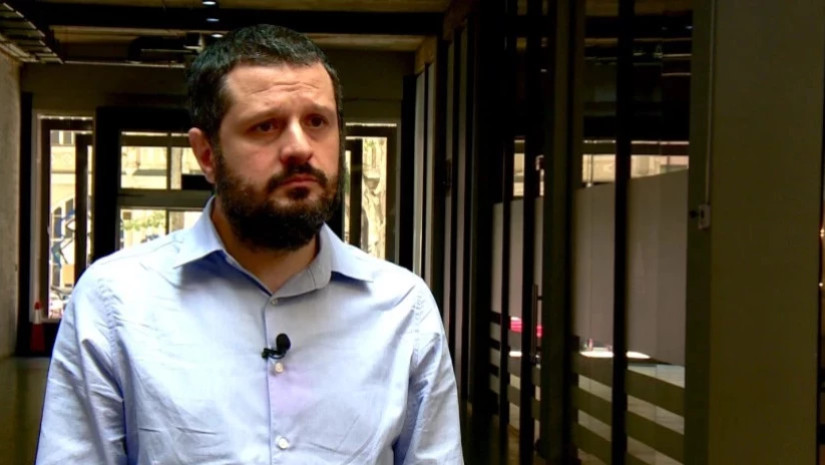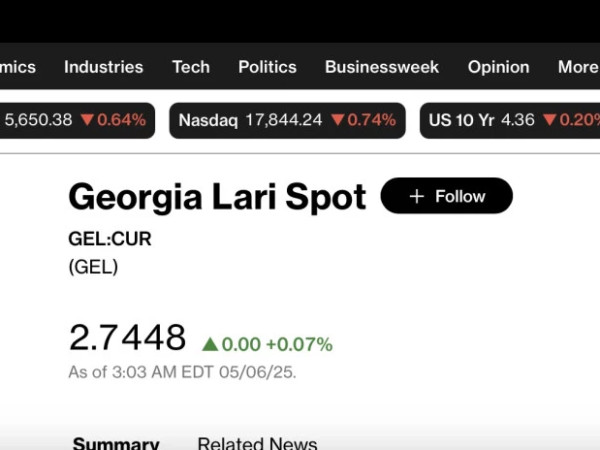“The 9.3% economic growth in the first quarter seems to me to be anomal and unsustainable,” economist Giorgi Khishtovani wrote on social media.
In his opinion, he does not see the prospect of maintaining this indicator in the long term.
"The 9.3% economic growth in the first quarter seems to me an anomaly and an unsustainable phenomenon," economist Giorgi Khishtovani wrote in social networks.
In his opinion, he does not see prospects for maintaining this indicator in the long term.
"First of all, thanks to this table: with real economic growth in the first quarter of 2023 at 7.3%, tax revenues of the consolidated budget in the first four months increased by 18% in nominal terms; in the first quarter of 2024, economic growth of 7.8% was followed by a 24% increase in taxes collected; in four months it grew by only 4.1%. This seems strange to me.
In addition, the results for the first quarter of the following important indicators further strengthens my suspicions.
Remittances: $786 million (Q1 2025); $812 million (Q1 2024) (down about 3%). (NBG)
- Local exports (excluding re-exports): $641 million (Q1 2025); 642 (Q1 2024); (up about 0%). (Sakstat)
- Number of people receiving wages and salaries: March 2025 vs. March 2024: up about 0.3% (PMCG).
Additionally, we can look at the sectoral results:
- Tourism revenues: $826 million (1Q, 2025); $807 million (1Q, 2024) (approx. 2.3% nominal growth) (NGB).
- Construction Sector Market Size (Nominal): 1Q, 2025 vs. 1Q, 2024: Approximately 1.1% decline (Galt and Taggart); Approximately 5.6% growth (Colliers Georgia).
We can also observe business and consumer sentiment:
- The business climate has significantly deteriorated in the first quarter (BAG Index, ISET Business Confidence Index); which, as a rule, should have negatively affected business investment activities.
- 56% of the population believes that the financial crisis has already begun or will begin soon; while 36% of the population says that their economic situation has worsened. While only 20% report that the situation has improved (ACT Research). This circumstance, in turn, should have worsened so-called consumer confidence, which should have affected the creation of savings and a reduction in consumer spending.
To summarize, most macroeconomic, fiscal, sectoral and sentiment indicators show that the economy is in the same level or has worsened compared to the first quarter of the previous year. Accordingly, moderate economic growth in Georgia in the first quarter can be explained by hyperactive stimulation of consumer spending by the business (including tourism) and banking sectors (promotions, special offers, cashbacks, etc.), hyper-supply in the real estate market (e.g., a significant reduction in the down payment, previously absent offer of multi-year domestic installments for buyers, etc.).
If this is true, then all this must happen at the expense of reducing the current profits of enterprises that is evidenced by the fact that, compared to the previous year, in the first 4 months the budget received approximately 15% less profit tax in nominal terms. I also believe that a very detailed critical analysis of the consumer basket is necessary in order to better see how adequate the inflation rate is today, which, if artificially reduced, in turn has a positive effect on economic growth.
"Taking all this into account, the 9.3% economic growth in the first quarter of 2025 seems to me to be anomaly and unsustainable, which, even according to Sakstat data, should soon significantly decrease, all other things being equal," writes Giorgi Khishtovani.


















